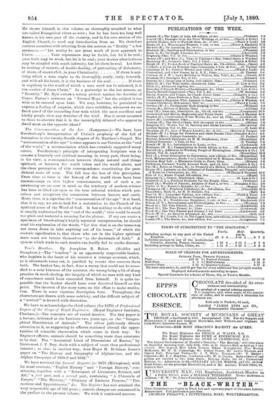The Consummation of the .4 ye. (Longmans.)—We have here Swedenborg's
interpretation of Christ's prophecy of the fall of Jerusalem in the twenty-fourth chapter of St. Matthew's Gospel. The "consummation of the age" is what appears in ourVersion as the "end of the world," a mistranslation which has certainly suggested many errors. Swedenborg's principle of interpreting Scripture was to assume a heavenly and spiritual meaning in every part, there being, in his view, a correspondence between things natural and things spiritual, or between the world below and the world above, and the cleat perception of this correspondence constituting the para- disiacal state of man. The fall was the loss of this perception. From time to time in the history of the world there have been reawakenings to this higher consciousness, and of such a re- awakening we are now in need, as the tendency of modern science has been to blind our eyes to the true celestial wisdom which per- ceives and recognises the connection between heaven and earth. Here, then, is a sign that the "consummation of the age" is at hand, that is to say, 'we are to look for a restoration to the Church of the spiritual sense of the Word of God. It has nothing to do with what is usually understood by the "end of the world ;" that would be much too plain and material n meaning for the phrase. If any one wants a specimen of Swedenborg's highly mystical interpretation, he should read his explanation of the words, "Let him that is on the house-top not come down to take anything out of his house," of which the esoteric signification is, that those who are in the higher spiritual state must net betake themselves "to the doctrinals of faith." A system which leads to such results can_hardly fail to excite distrust.


































 Previous page
Previous page